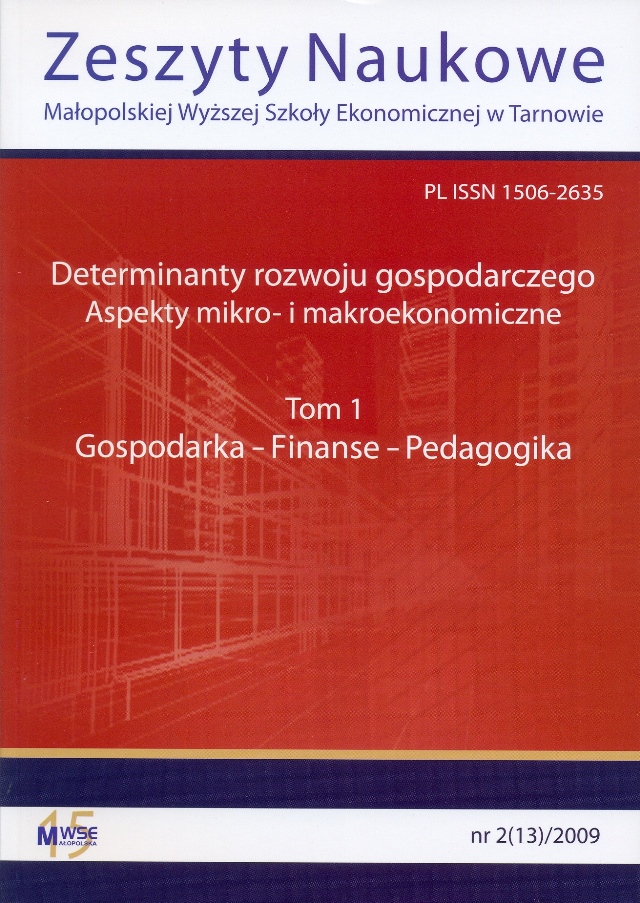Abstract
Economy conducted in reality is limited by fundamental laws. These laws include, among others, energy conservation principle, random and spontaneous growth of disorder and cost-effectiveness law. The first two laws cannot be omitted; they constitute a nature of reality. An attempt to violate these laws leads to a catastrophe and crisis. Financial crisis appears in the economy, when the principle of conservation of capital is dishonored. It is true, if Central Banks create too much cash money and transfer it to commercial banks. Thanks to the understanding, that the capital is an ability to perform work, we know that this procedure disturbs the first fundamental principle. Additionally, the recent discovery of the economic constant shows, that the possibilities of growth are limited. Therefore, the overflow of cash causes fast financial growth, and then economic ratio has to adjust to its feasible real value, that is to the limitations determined by nature of reality.
References
Aoki M. 2009. Letter from Masahiko Aoki. [online]. 2008-2011 IEA President, Dostępny w Internecie: http://www.iea-world.com/page/index_newsletter.html.
View in Google Scholar
Atkins P. 2005. Palec Galileusza. Dziesięć wielkich idei nauki. Poznań: Dom Wydawniczy Rebis. ISBN 83-7301-541-8. [Galileeo's Finger - The Ten Great Ideas of Science, 2003]. Bernstein P.L. 2007. Capital Ideas Evolving. Hoboken: John Wiley & Sons. ISBN 978-0-471-73113-3.
View in Google Scholar
Cornford A. 2005. Everything You Wanted to Know about Basel II but Were Afraid to Ask, „Finance & Common Good” no. 21, Spring.
View in Google Scholar
Cieślak I. 2007. Rachunek kapitału ludzkiego jako podstawa zarządzania kosztami pracy. Praca doktorska. Warszawa: Akademia im. Leona Koźmińskiego.
View in Google Scholar
Cieślak I., Dobija M. 2007. Teoretyczne podstawy rachunkowości kapitału ludzkiego. „Zeszyty Naukowe” nr 735. Kraków: Akademia Ekonomiczna.
View in Google Scholar
Cieślak I., Kucharczyk M. 2004. Kształtowanie cen artykułów rolnych. W: Wiejskie gospodarstwa domowe w obliczu problemów transformacji, integracji i globalizacji. Pod red. M. Adamowicza. Warszawa: Wydawnictwo SGGW. ISBN 83-7244-464-1.
View in Google Scholar
Dobija M. 2004. Theories of Chemistry and Physics Applied to Developing an Economic Theory of Intellectual Capital. W: S. Kwiatkowski, P. Houdayer (eds.). Knowledge Cafe for Intellectual Entrepreneurship THROUGH or AGAINST Institutions. Warszawa: Wydawnictwo WSPiZ im. Leona Koźmińskiego. Dostępny w SSRN: http://ssrn.com/author=518110.
View in Google Scholar
Dobija M. 2005. Financing Labour in the Public Sector without Tax Funds. „Argumenta Oeconomica Cracoviensia” no. 4, pp. 5-20. Dostępny w SSRN: http://ssrn.com/abstract=956553.
View in Google Scholar
Dobija M. 2006. Teoretyczne przesłanki wartości godziwej. „Zeszyty Teoretyczne Rachunkowości” t. 32(88). Dobija M. 2007. Abstract Nature of Capital and Money. W: L.M. Cornwall (ed.). New Developments in Banking and Finance. New York: Nova Science Publishers.
View in Google Scholar
Dobija M. 2008. Labour Productivity Ratio and International Comparison of Economic Performance ― Formalization of the PPP Theory and Preliminary Examinations. Paper presented at IEA 15th World Congress, Istanbul, Turkey, June 25-29, 2008. Available at SSRN: http://ssrn.com/abstract==l 159729.
View in Google Scholar
Dobija M. 2009. Produktywność pracy a rozmiar sektora publicznego. „Master of Business Administration” nr 1(96) styczeń‒luty.
View in Google Scholar
Goetzmann W.N., Ibbotson R.G. 2005. History and the Equity Risk Premium (April 6, 2005) „Yale ICF Working Paper” no. 05-04, April 6. Available at SSRN: http://ssrn.com/abs-tract=702341.
View in Google Scholar
Kozioł W. 2005. Aналimuчна φyнкція βupoбнuцmβa y фopмyβанні npeміальнux onлam npaці. W: Концеnція poзϐumку буxϨалmepcькоϨо обліку аналізу і аубumy ϐ yмоϐаx міжнаробної інmeѕрації meзu боnоϐібі. Red. A.Д. Бутко, Київський національний торговельно-економіУний університет 20-22 квітня 2005.
View in Google Scholar
Krabbe J.J., 1993. A „Physiocratic” Approach to Sustainability. “International Journal of Social Economics” vol. 20, no. 9, pp. 15-21. MCB University Press.
View in Google Scholar
Knight F.H. 1921. Risk, Uncertainty, and Profit, [online, dostęp: 2006-02-15]. Boston: Hart, Schaffner & Marx; Houghton Mifflin Company. Dostępny w Internecie: http://www.econlib.org/li-brary/Knight/knRUP7.html.
View in Google Scholar
Kuchmacz J. 1996. Badanie stopy zwrotu z zainwestowanego kapitału w warunkach efektywnego rynku. „Zeszyty Naukowe Akademii Ekonomicznej w Krakowie” z. 467. Kraków: Akademia Ekonomiczna.
View in Google Scholar
Kuchmacz J. 2004. Examining Changes in the Rate of Return in the Contexts of Market Efficiency. W: M. Dobija, S. Martin (red.). General Accounting Theory Towards Balancing the Society. Kraków: Akademia Ekonomiczna.
View in Google Scholar
Kurek B. 2007. Hipoteza deterministycznej premii za ryzyko, praca doktorska (PhD thesis), Kraków: Uniwersytet Ekonomiczny.
View in Google Scholar
Kurek B. 2008. The Risk Premium Estimation on the Basis of Adjusted ROA. W: I. Górowski (Ed.). General Accounting Theory. Evolution and Design for Efficiency, Warsaw: Wydawnictwa Akademickie i Profesjonalne, s. 375-392.
View in Google Scholar
Kurek B. 2009. An Adjusted ROA as a Proxy for Risk Premium Estimation. Referat na 32nd Annual Congress European Accounting Association, Tampere, Finland, 12-15 May 2009.
View in Google Scholar
McDonalds. 1999. Big MacCurrencies. “Economist” vol. 351, iss. 8113, p. 66.
View in Google Scholar
Pikulska-Robaszkiewicz A. 1999. Lichwa w państwie i prawie republikańskiego Rzymu, Łódź: Wydawnictwo Uniwersytetu Łódzkiego. ISBN 83-7171-255-3.
View in Google Scholar
Stankiewicz W. 2000. Historia myśli ekonomicznej. Warszawa: PWE. ISBN 83-208-1276-3.
View in Google Scholar
Strzelecki J. 2009. Wina banków centralnych. „Gazeta Bankowa” z 11. 05. 2009.
View in Google Scholar
Welch I. 2000. Research Roundtable Discussion: The Market Risk Premium (June 30, 2000). Available at SSRN: http://ssrn.com/abstract=234713.
View in Google Scholar
Wright R. 2000. The Logic of Human Destiny. Wydanie polskie: Nonzero. Logika ludzkiego przeznaczenia. Warszawa: Prószyński.
View in Google Scholar
Zarlenga S. 2008. The Need for Monetary Reform, [online]. American Monetary Institute. Dostępny w Internecie: http://www.monetary.org/need_for_monetary_refonTi.html.
View in Google Scholar
© Copyright by Małopolska School of Economics in Tarnów. The articles are available under the Creative Commons Attribution NonCommercial-NoDerivatives 4.0 International License


